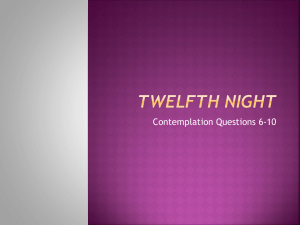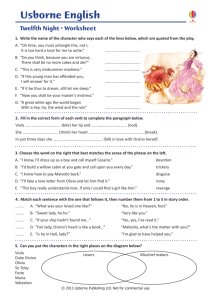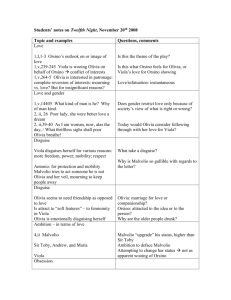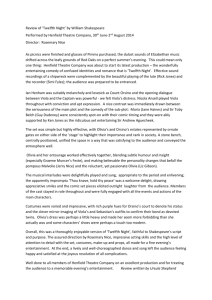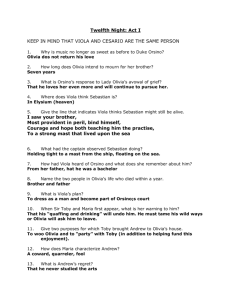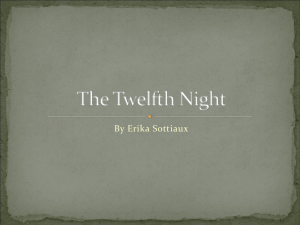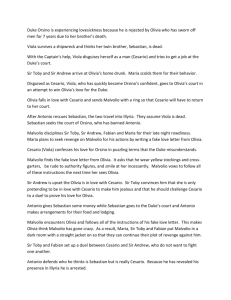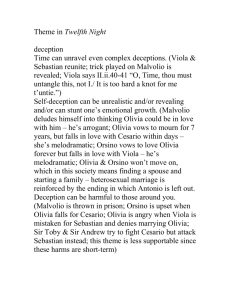ENG1DB Twelfth Night Unit Test Review Please complete the
advertisement
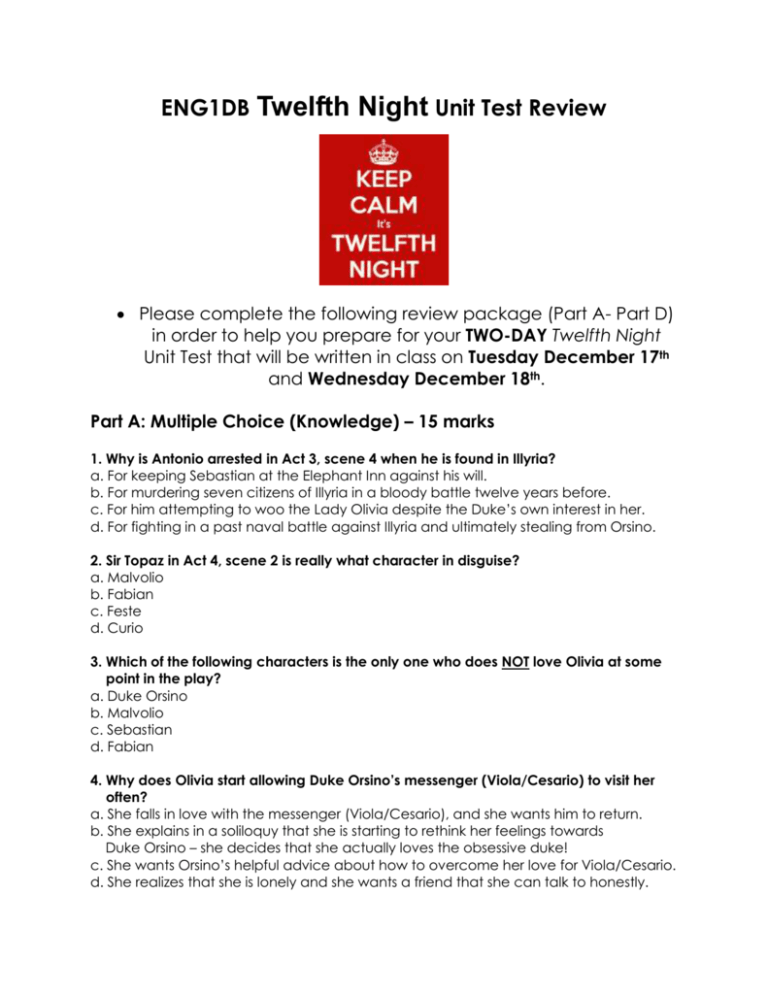
ENG1DB Twelfth Night Unit Test Review Please complete the following review package (Part A- Part D) in order to help you prepare for your TWO-DAY Twelfth Night Unit Test that will be written in class on Tuesday December 17th and Wednesday December 18th. Part A: Multiple Choice (Knowledge) – 15 marks 1. Why is Antonio arrested in Act 3, scene 4 when he is found in Illyria? a. For keeping Sebastian at the Elephant Inn against his will. b. For murdering seven citizens of Illyria in a bloody battle twelve years before. c. For him attempting to woo the Lady Olivia despite the Duke’s own interest in her. d. For fighting in a past naval battle against Illyria and ultimately stealing from Orsino. 2. Sir Topaz in Act 4, scene 2 is really what character in disguise? a. Malvolio b. Fabian c. Feste d. Curio 3. Which of the following characters is the only one who does NOT love Olivia at some point in the play? a. Duke Orsino b. Malvolio c. Sebastian d. Fabian 4. Why does Olivia start allowing Duke Orsino’s messenger (Viola/Cesario) to visit her often? a. She falls in love with the messenger (Viola/Cesario), and she wants him to return. b. She explains in a soliloquy that she is starting to rethink her feelings towards Duke Orsino – she decides that she actually loves the obsessive duke! c. She wants Orsino’s helpful advice about how to overcome her love for Viola/Cesario. d. She realizes that she is lonely and she wants a friend that she can talk to honestly. 5. Why does Sebastian beat up Sir Andrew in Act 4, scene 1? a. To avenge his sister b. Because Sir Andrew attacks him first c. In an effort to save Antonio d. Because Sir Andrew has been dating his wife 6. What does Malvolio do in the play that concerns Olivia regarding his mental state? a. He is rude to Maria in front of Olivia and he is inappropriately flirtatious with Olivia b. He wears yellow stockings that are cross-gartered c. He smiles constantly and he kisses his own hand often d. All of the above 7. In Maria’s forged letter, Malvolio is told that, “Some are born ____, some achieve _____-ness, and some have _____-ness thrust upon them.” (HINT: one word completes all of the blanks) a. Rich b. Cheerful c. Ridiculous d. Great 8. Which THREE characters do NOT get a happy ending at the conclusion of the play? a. Duke Orsino, Olivia and Sir Toby Belch b. Sebastian, Viola and the Sea Captain c. Malvolio, Sir Andrew Aguecheek and Antonio d. Fabian, Feste and Maria 9. When Viola is speaking with the Sea Captain in Act 1, scene 2, she says, “My brother he is in Elysium”. Where does Viola think her brother is at this point in the play? a. She thinks that he is in a small city in Ireland recovering from the shipwreck b. She thinks that he is dead at the bottom of the ocean c. She thinks that he is in Heaven d. She thinks that he is stuck in Purgatory (a place between Heaven and Hell) 10. A specific metaphor is used several times throughout the play to compare love to something else. What is it? a. A plague b. A gift c. A nightmare d. A bird trapped in a cage 11. What THREE literary devices are being used in Act 1, scene 5 of the play when Duke Orsino says to Viola (disguised as Cesario), “Diana’s lip/Is not more smooth and rubious; thy small pipe/Is as the maiden’s organ, shrill and sound;/And all is semblative a woman’s part”? a. Dramatic Irony, Allusion and Simile b. Personification, Foreshadowing and Metaphor c. Imagery, Onomatopoeia and Alliteration d. Pun, Assonance and Hyperbole 12. When Viola/Cesario first comes to deliver Duke Orsino’s declarations of love to Olivia, she scolds Olivia by saying, “Lady, you are the cruell’st she alive/If you will lead these graces to the grave/And leave the world no copy”. What is Viola/Cesario saying to Olivia here? a. Lady, you are the cruellest woman alive if you will allow Duke Orsino to die from his love for you. b. Lady, you are the cruellest woman alive if you will die without having a child to whom you can pass on your beauty. c. Lady, you are the cruellest woman alive if you mourn for so long and waste your life. d. Lady, you are the cruellest woman alive if you hide your perfect beauty behind an ugly, black veil all day. 13. What is the fake name that Sebastian uses when he is first rescued in order to protect his identity from possible thieves and ill-intentioned sailors? a. Patrick b. Marcus c. Roderigo d. Nigel 14. Where are Viola and Sebastian originally from? a. Kent b. London c. Messaline d. Norway 15. What is Fabian’s motivation for wanting to humiliate Malvolio, which ultimately causes Fabian to participate in the prank against him? a. He is angry with Malvolio for getting the steward position over him the year before b. He is angry with Malvolio for telling him that he lacked culture and manners c. He is angry with Malvolio for scolding him for drinking and eating too much d. He is angry with Malvolio for telling Olivia that he was bearbaiting Part B: Passage Analysis (Application) – 10 marks Please respond to each question using complete sentences! Remember that you must analyze the following TWO sight passages in the following way: 1) Identify the speaker of the speech (1 mark) 2) Identify to whom the speaker is speaking (1 mark) 3) Comment on the significance of this passage to the play (i.e. character development, plot development, theme, imagery, dramatic irony, metaphors, similes, personification, etc.) (3 marks) Please read through the passages several times before formulating your responses for each. Make sure that you include 3 marks worth of detailed information for the “significance” section of the sight passage response for both passages (question #3) Passage #1: “This fellow is wise enough to play the fool; And to do that craves a kind of wit. He must observe their mood on whom he jests, The quality of persons, and the time, And, like the haggard, check at every feather That comes before his eye. This is a practice As full of labour as a wise man's art; For folly that he wisely shows is fit, But wise men, folly-fall'n, quite taint their wit.” Passage #2: “If music be the food of love, play on; Give me excess of it, that, surfeiting, The appetite may sicken, and so die. That strain again! it had a dying fall: O, it came o'er my ear like the sweet sound That breathes upon a bank of violets, Stealing and giving odour! Enough; no more. 'Tis not so sweet now as it was before. O spirit of love! How quick and fresh art thou! That, notwithstanding thy capacity Receiveth as the sea, nough enters there, Of what validity and pitch soe'er But falls into abatement and low price, Even in a minute: so full of shapes is fancy, That it alone is high fantastical.” Part C: Short Answer (Thinking) – 20 marks Please answer each question in complete sentences in the space provided, and include 5 marks worth of quality detail, relevant reflection, and meaningful analysis for each of your responses. 1. In the play, Duke Orsino is a character who is undeniably in love with love. Comment on how the Duke’s obsession with love shapes his characterization, and how this ultimately makes the audience feel about his character in the text? (5 marks) ______________________________________________________________________________ ______________________________________________________________________________ ______________________________________________________________________________ ______________________________________________________________________________ ______________________________________________________________________________ ______________________________________________________________________________ ______________________________________________________________________________ ______________________________________________________________________________ 2. What is the role of the comedic characters in the play (Maria, Sir Toby, Sir Andrew, Feste, Fabian)? How are they different from one another? Which character do you think is the most important to the play? Explain why? (5 marks) ______________________________________________________________________________ ______________________________________________________________________________ ______________________________________________________________________________ ______________________________________________________________________________ ______________________________________________________________________________ ______________________________________________________________________________ ______________________________________________________________________________ ______________________________________________________________________________ ______________________________________________________________________________ 3. Compare Duke Orsino and Olivia, and discuss how their attitudes about love are similar or different. What does Shakespeare suggest about the nature of love and other powerful feelings through his portrayal of these two characters? (5 marks) ______________________________________________________________________________ ______________________________________________________________________________ ______________________________________________________________________________ ______________________________________________________________________________ ______________________________________________________________________________ ______________________________________________________________________________ ______________________________________________________________________________ ______________________________________________________________________________ 4. Disguise and deception are central ideas that contribute to the plot development of Twelfth Night. Why do these concepts have such thematic significance in the play? Explain thoughtfully. (5 marks) ______________________________________________________________________________ ______________________________________________________________________________ ______________________________________________________________________________ ______________________________________________________________________________ ______________________________________________________________________________ ______________________________________________________________________________ ______________________________________________________________________________ ______________________________________________________________________________ __________________________________________________________________ Part D: Paragraph Response (Communication) – 10 marks Please respond to the prompt question provided below in a complete paragraph (9-10 sentences) using a correct point, proof, analysis format. Helpful tips when you are writing your response paragraph: 1) Take a clear and explicit position on the topic prompt (question). 2) All specific references to the text will serve as the proof for your paragraph (direct quotations are not required here, but a description of specific moments from the play are required as your proof) 3) Do not simply summarize the plot! Prove the position you take on the prompt question using specific references to the play, and analyze why those references are important. In your response paragraph, include: (9-10 sentences) An introductory sentence Your thesis statement which will express you position on the question 2 points (supporting arguments) and 2 proofs (paraphrase your examples from the text) 2 well-written explanations (analysis) as to why your points/proofs support your thesis Remember to include a concluding sentence Question: Who is the most foolish character in the play? Take a position on this question and defend it thoughtfully using direct evidence (paraphrased examples) from the text to support your assertions. ______________________________________________________________________________ ______________________________________________________________________________ ______________________________________________________________________________ ______________________________________________________________________________ ______________________________________________________________________________ ______________________________________________________________________________ ______________________________________________________________________________ ______________________________________________________________________________ ______________________________________________________________________________ ______________________________________________________________________________ ______________________________________________________________________________ ______________________________________________________________________________ ______________________________________________________________________________ ______________________________________________________________________________ ______________________________________________________________________________ ______________________________________________________________________________ ______________________________________________________________________________ ______________________________________________________________________________ ______________________________________________________________________________ ______________________________________________________________________________ ______________________________________________________________________________ ______________________________________________________________________________ ______________________________________________________________________________ ______________________________________________________________________________ ______________________________________________________________________________ ______________________________________________________________________________ ______________________________________________________________________________ ______________________________________________________________________________ ______________________________________________________________________________
